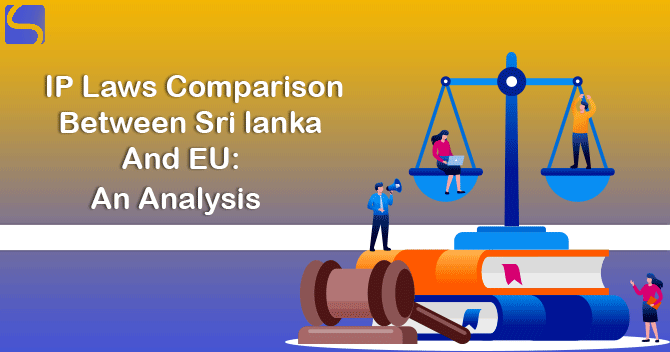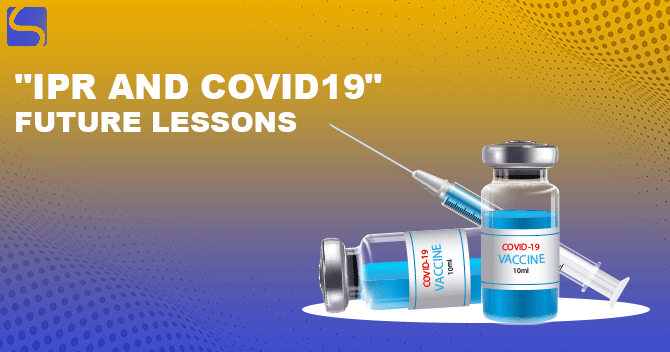IP Laws Comparison between Sri Lanka and EU: An Analysis

Siddharth Verma | Updated: Nov 25, 2021 | Category: IPR
Intellectual property law is the branch of Law that confers intangible and exclusive rights to the owner of the work so that their rights should be protected under the Law. The intellectual property right encompasses copyright, Trademark, Design, and patent. Although, the basic conceptuality of Intellectual property rights is recognized and accepted globally. Many developed and developing countries enforce the Laws regarding the IPR to protect the rights of every individual. The fundamental aspect of the Intellectual Property Law is continuous expansion. However, the object of the intellectual property law is to safeguard human invention and their IP rights. In this article, we will comprehensively analyze and distinguish the IP Laws in India and the EU. Scroll down to check the IP Laws comparison between Sri Lanka and the EU.
Table of Contents
Intellectual property laws in EU
IP Laws prevail in European Union, and it has the origin in Europe. The regulation in respect of IP laws in the European Union plays a very significant role in protecting the rights of the citizens. Many conventions cover this, most enacted by the (WIPO) World Intellectual Property Organization[1] and World Trade Organization. The European Parliament and Council’s primary goal of 17 April 2019 is to establish a comprehensive and consistent legal framework to encourage innovation, creativity, investment, and the creation of new content, including in the digital environment, to avoid segmentation of the internal market. The EU directives also make it easier to use content that is in the public domain.
Intellectual Property Laws in Sri Lanka
In IP Laws comparison with EU, Sri Lanka established IP laws in the country from Roman-Dutch Law and English Law. The British government provided the common Law of the land. The intellectual property laws in Sri Lanka have been rooted since the colonial period. With the introduction of the open economy, Sri Lanka was compelled to build a better framework for preserving intellectual property rights in the context of an expanding commercialized society. As a result of this necessity, the Code of Intellectual Property Act 1979 was enacted as part of the program to update all business laws in the country, based on suggestions from the World Intellectual Property Organization. Sri Lanka was required to an intellectual property law regime in accordance with the TRIPS Agreement’s provisions. As a result, the Intellectual Property Act No. 36 of 2003 was passed in 2003, strictly following TRIPS norms. The Intellectual Property Act, 2003, passed by Parliament to preserve and recognize the country’s intellectual property rights, is the foundation of Sri Lankan copyright law. Copyright, patents, designs, trademarks, and trade names are protected by Sri Lankan intellectual property law. The Intellectual Property Act, which covers various topics, also governs the current state of unfair competition.
The mechanism for enforcing IP laws in Sri Lanka
In Sri Lanka, there are four mechanisms to implement Intellectual Property Laws: Criminal Judicial procedures, Civil judicial procedures, and penalties. The Director-General of Intellectual Property is in charge of customs control and dispute resolution. The copyright period for works made by persons is currently 70 years plus the author’s life. Under the Act, the owner of intellectual property rights can file a civil complaint in court against those who violate, threaten to infringe on, or are likely to violate their rights. The owner has three options: injunction, damages, and other equitable redresses as determined by the court. In addition, the court has the authority to issue orders relating to IP rights enforcement, such as the removal of infringing items from the commerce channel or the distribution of goods with compensation. Intentional infringement of intellectual property rights is now punished by fines, jail, or both under the Intellectual Property Act, with procedures brought by either the owner of the IP right in question or the police. Owners of copyright or associated rights which have been aggrieved or affected by a breach of their rights can seek restitution from the Director-General of Intellectual Property. It’s a sort of enforcement that’s more like a conflict settlement system than a quasi-judicial investigation.
IP Laws comparison between Sri Lanka and EU
If we discuss the IP Laws Comparison between Sri Lanka and the EU, we can observe that the IP Laws in both countries differ. The EU influences the prevailing IP Laws in Sri Lanka. The following are some of the essential distinctions between the Laws of the two countries.
- The EU Directions shall ensure the promotion of academic research over the internet while safeguarding the author’s rights and ensuring cross-border participation. Comparatively, the rights of Sri Lankan authors are confined to black letters, same drafted in 2003 and provide the implementation of a territorial nature.
- EU directives protect internet-based rights, including disseminating non-commercial works and other subject matters and the online accessibility of audiovisual works on video-on-demand platforms to provide complete access to the material. At the same time, the judicial system in Sri Lanka is entirely oblivious of the internet’s existence.
- According to EU directives, states must ensure that appropriate measures are in place to protect the legitimate interests of the right holder. While the Sri Lankan Intellectual Property Act’s sections 9 and 10 cover owners and creators, the Act lacks a proper structure.
Conclusion
In conclusion, as far as the IP Laws Comparison Between Sri Lanka and the EU is concerned Intellectual property rights is a concept that originated in the West and has since spread to Sri Lanka and other countries. The idea of intellectual property has caused many complexity and challenges in the public’s understanding of and critical principles.
Read our Article:Importance of IP Audits for Corporates: An Overview














